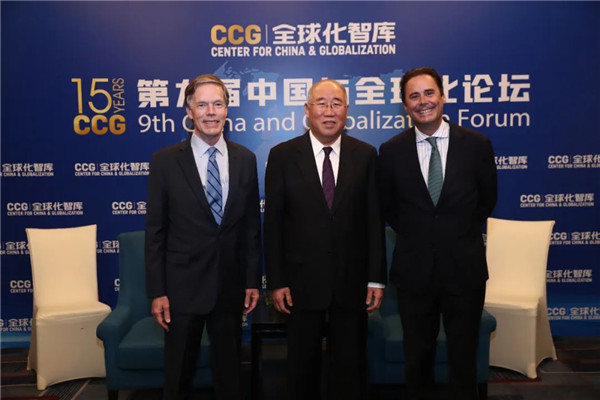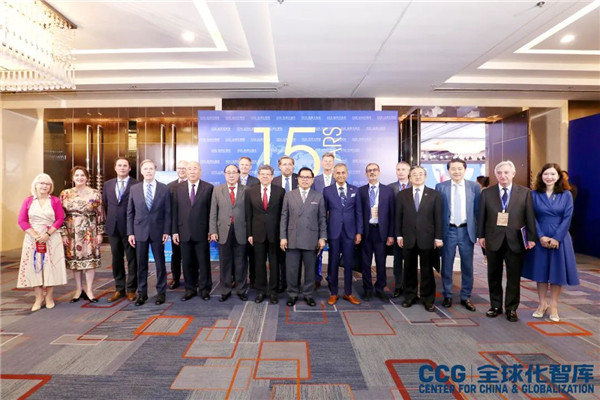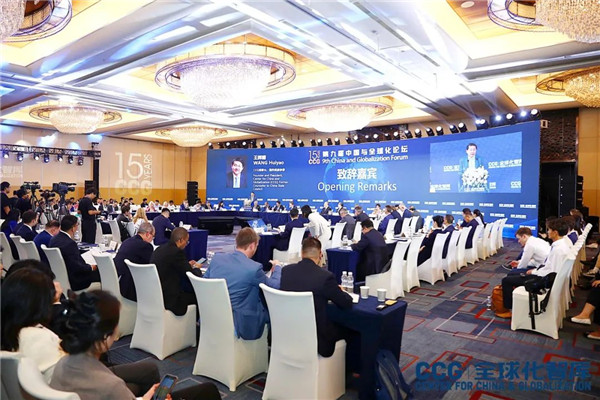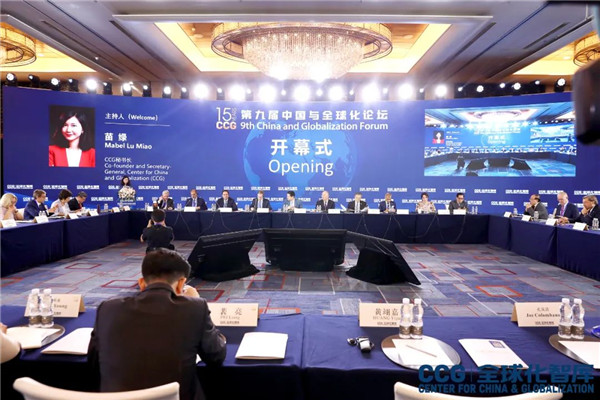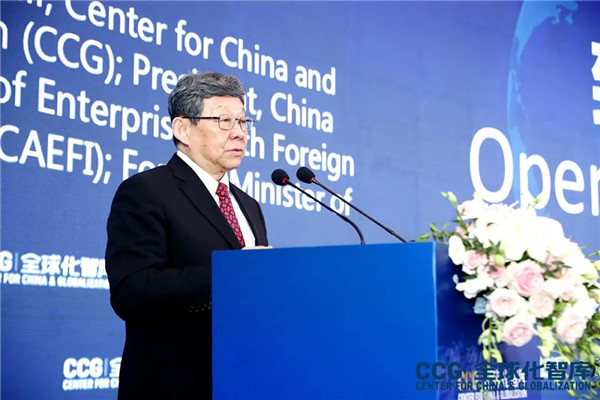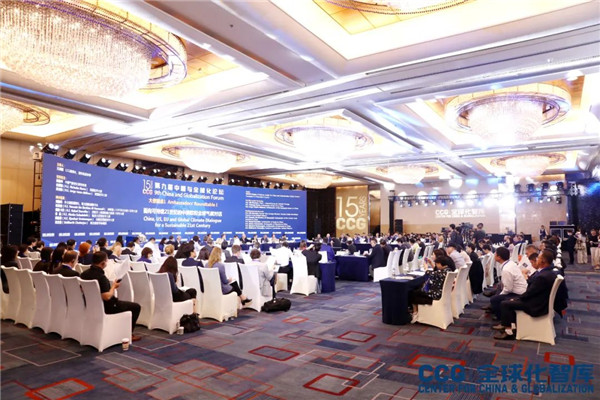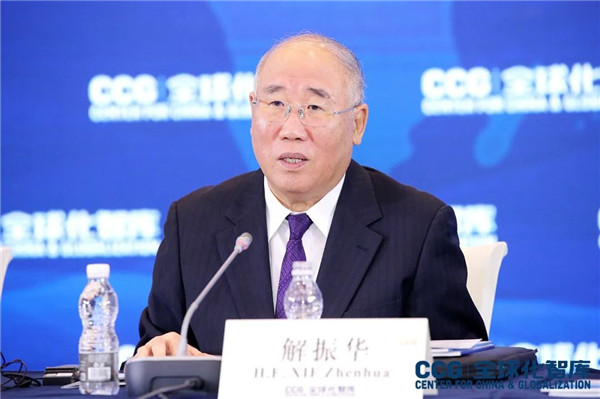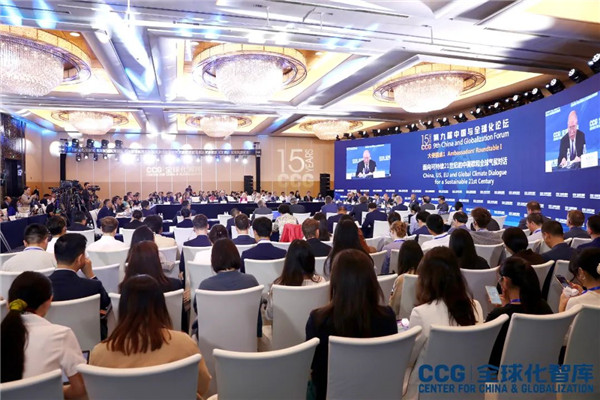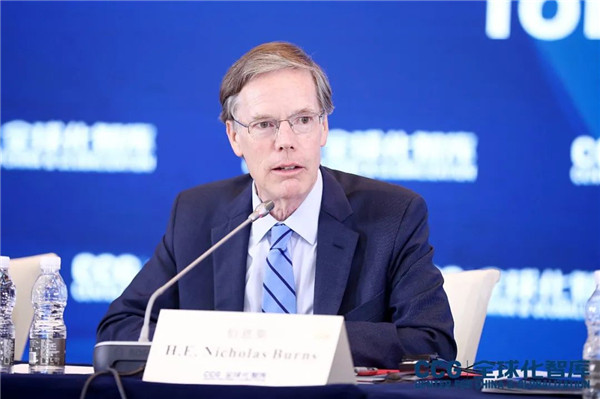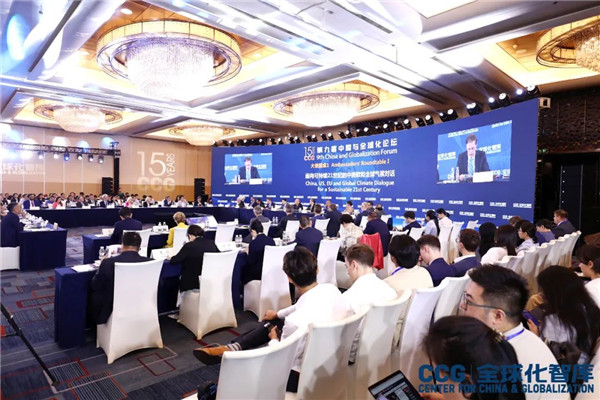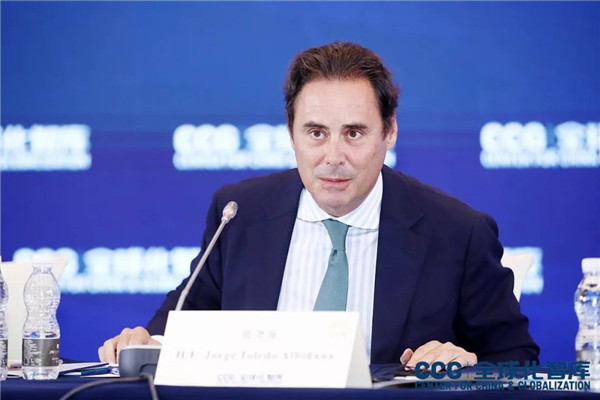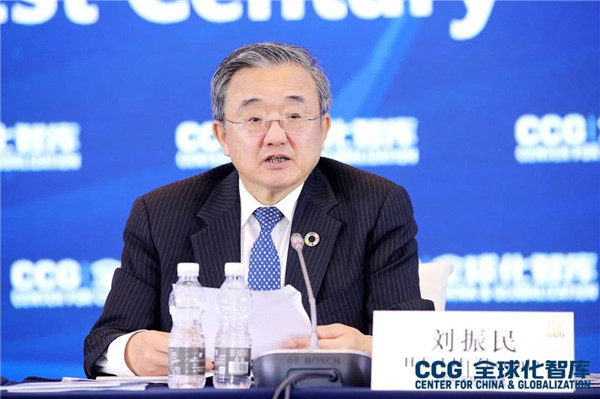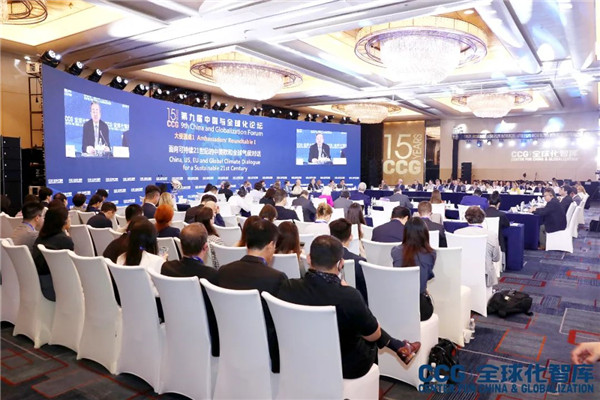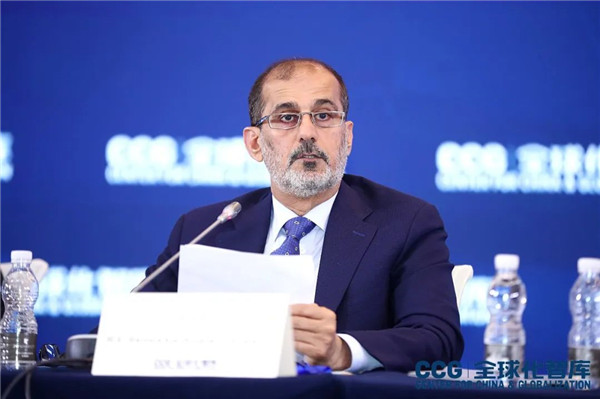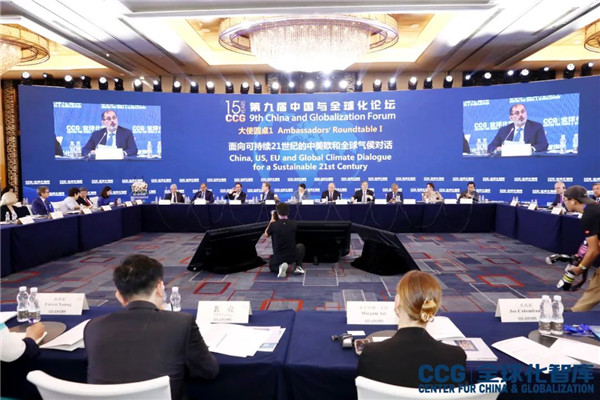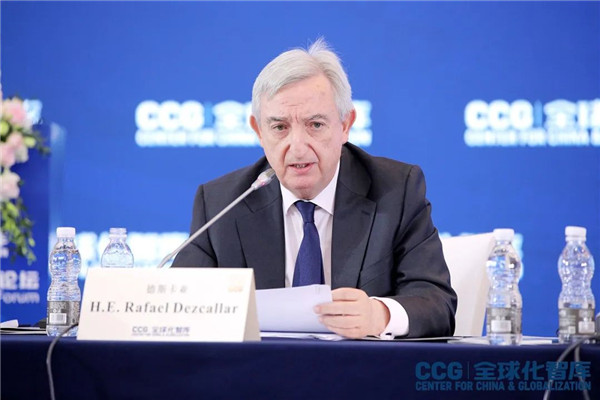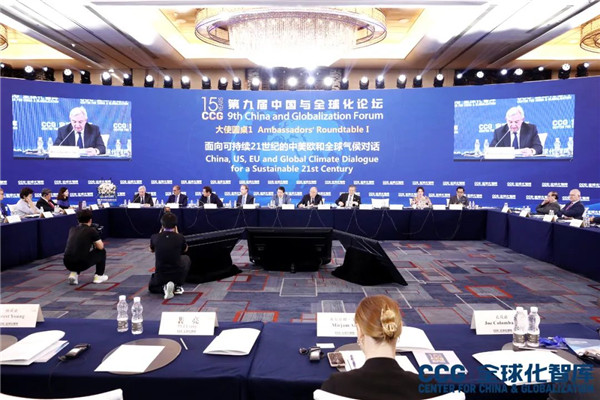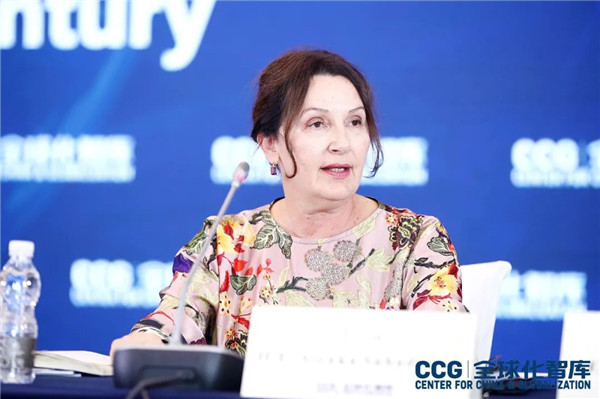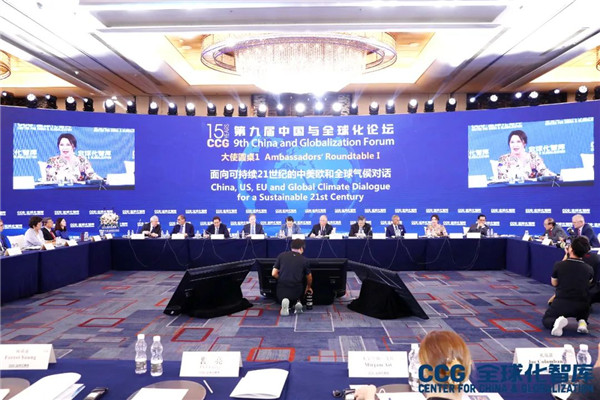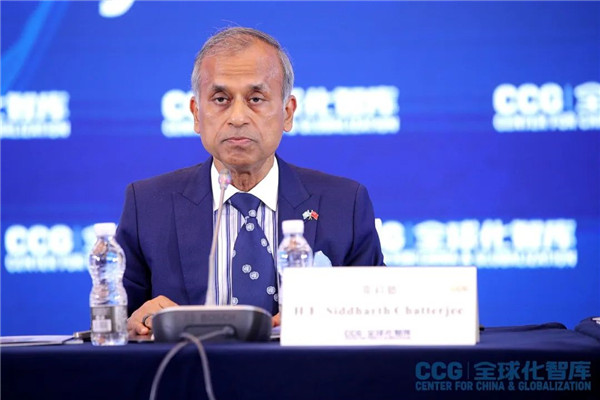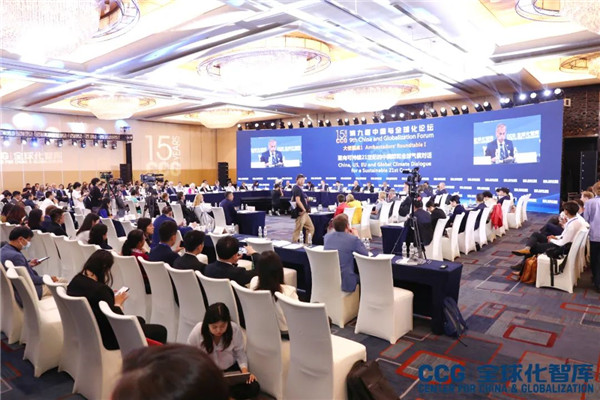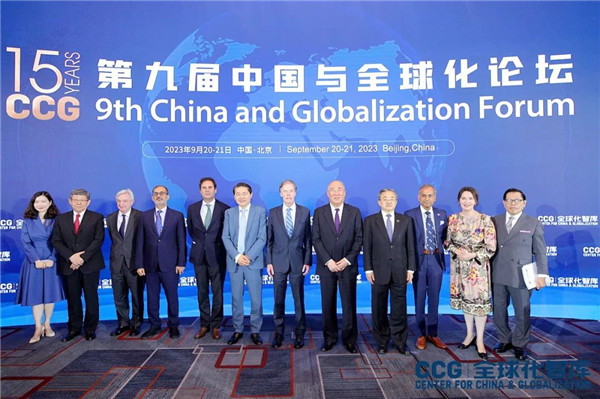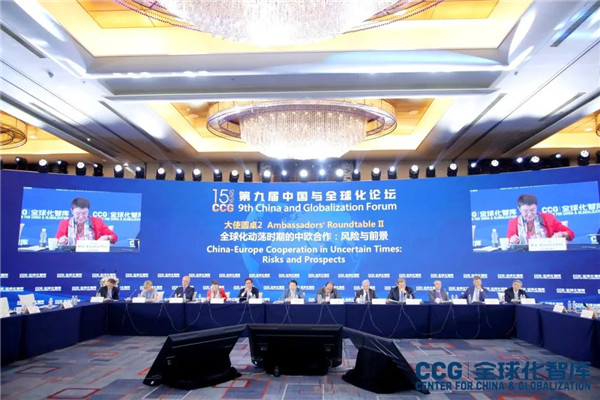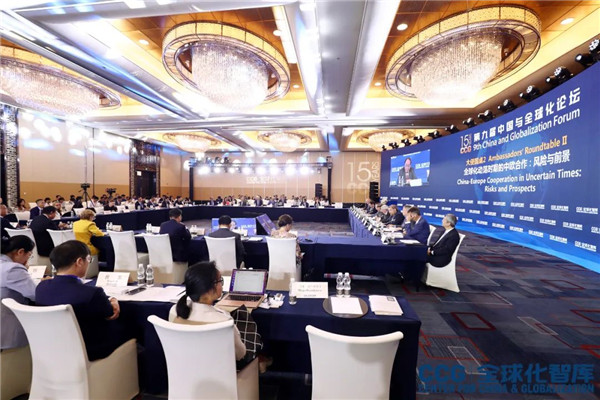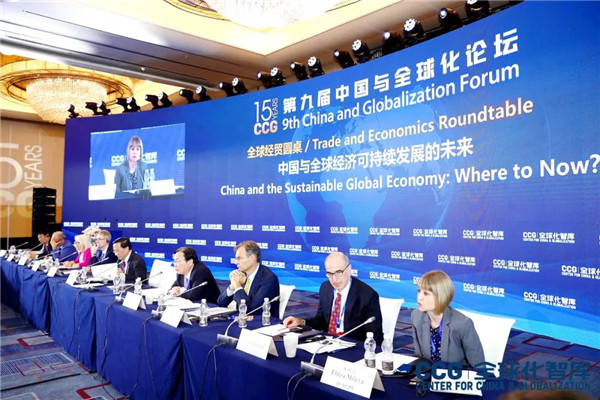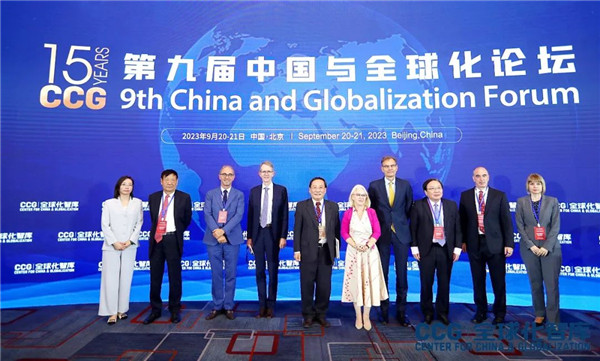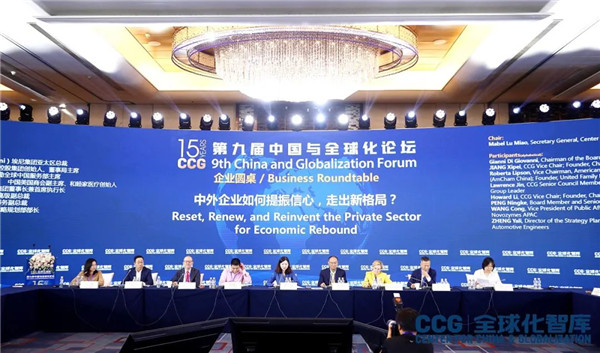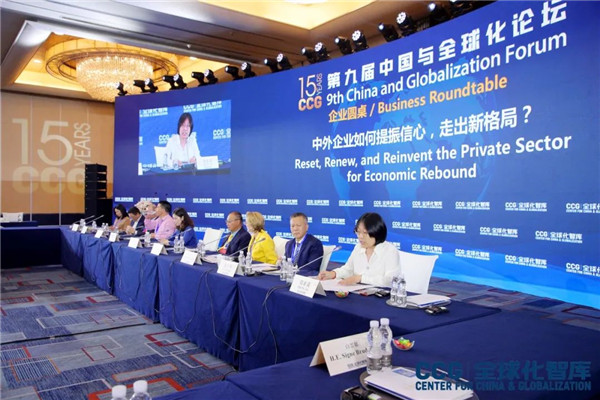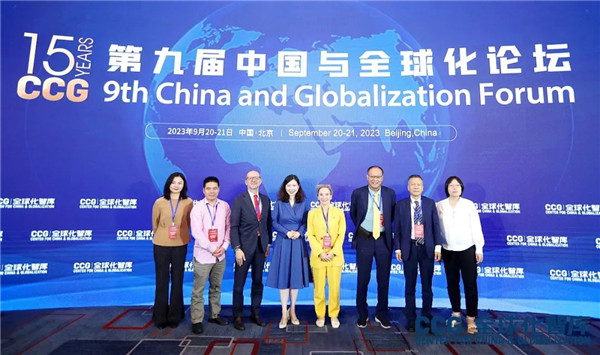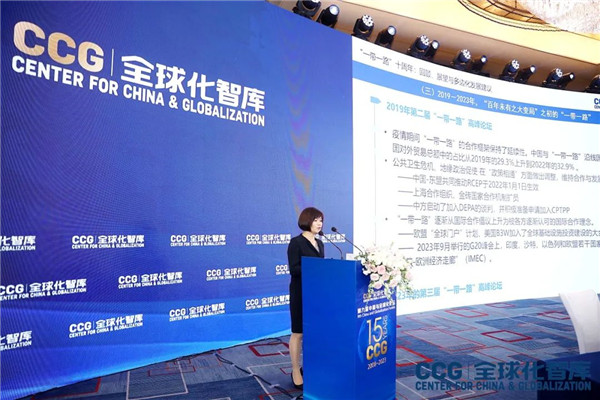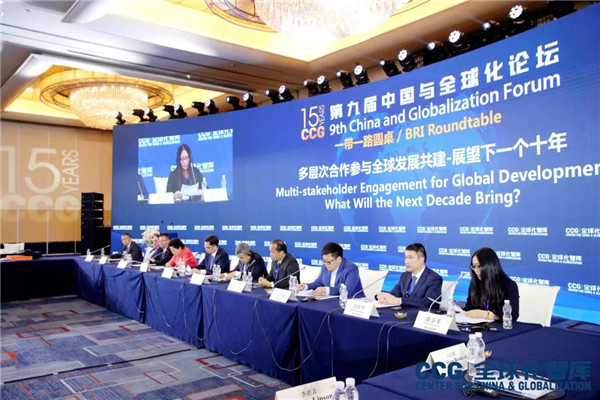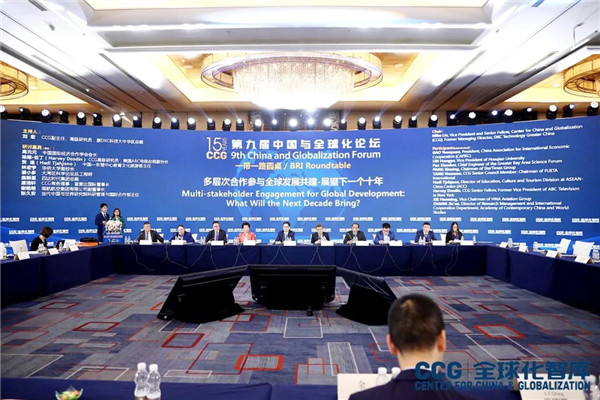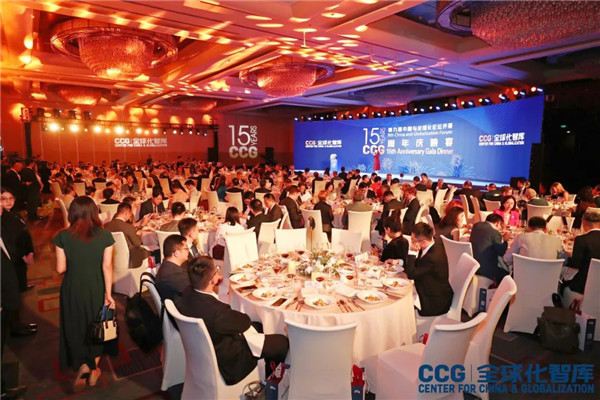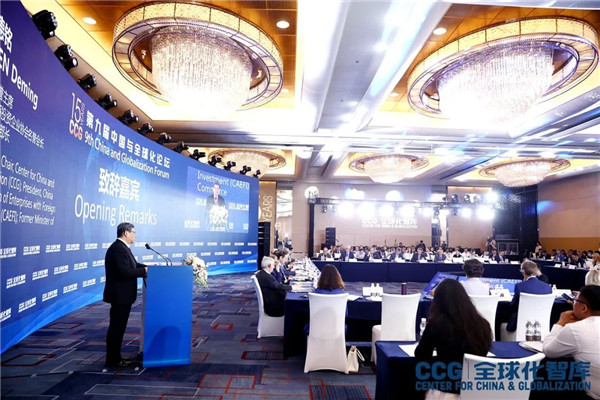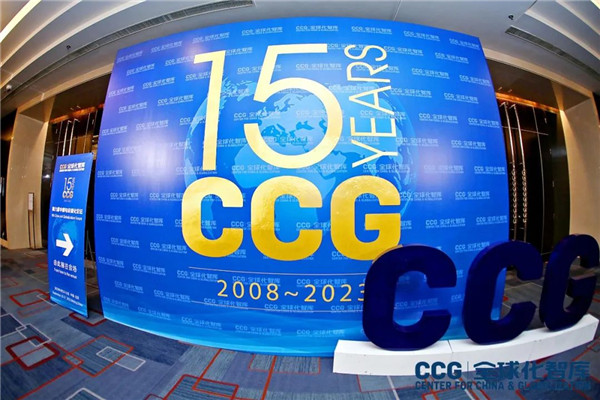CCG Holds 9th China and Globalization Forum
Videos | CCG 9th China and Globalization Forum
Beijing, September 21, 2023 – The 9th China and Globalization Forum, a significant event in the Center for China and Globalization’s (CCG) 15th-anniversary series, successfully concluded in Beijing. After two years, the forum returned to its offline format, drawing over 200 distinguished guests, including policymakers, diplomats, international organization representatives, experts, scholars, industry leaders, and media from across the globe. The forum provided a platform for robust discussions on pressing international issues, aiming to foster consensus and provide recommendations for China’s deepening reform, active participation in globalization, and engagement in global governance.
The forum encompassed an opening ceremony, five thought-provoking roundtable discussions, and a report release session, all centered around key global topics. Topics ranged from climate change challenges facing China, US, and EU in the 21st Century to China-Europe cooperation in uncertain times, China’s role in global sustainable economic development, challenges and strategies for Chinese and foreign enterprises, and multilevel cooperation within the Belt and Road Initiative (BRI).”
During the opening ceremony, Mabel Lu Miao, Co-founder and Secretary-General of CCG, introduced the distinguished guests. Wang Huiyao, President of CCG, set the stage by emphasizing the forum’s mission to tackle global issues like climate change, the future of global economic development, and major power relations. President Wang, against increasing uncertainties on the global stage, expressed his heartfelt wish for diverse perspectives and active exchanges for collective problem-solving, quoting CCG’s motto, “Global Vision for China, Chinese Wisdom for the World.”
Chen Deming, CCG Honorary Chair and former Minister of Commerce of China, shared insights on global economy and the current status of China-U.S. dialogue mechanisms. He advocated that China should uphold a pro-globalization stance, adhere to multilateralism while considering the interests of all countries, and integrate green concepts into global development and industrial supply chains. He called for enhanced communication and dialogue mechanisms between China and the U.S., emphasizing the need for cooperation in public health, elderly care, aerospace, and more to contribute actively to global development and economic recovery and jointly promote the reform and improvement of the global governance system.
Ambassadors’ Roundtable I, “China, US, EU, and Global Climate Dialogue for a Sustainable 21st Century”was chaired by Wang Huiyao, President of CCG. With no more than 100 days till the COP 28, this roundtable brought together prominent figures, including:
H.E. Xie Zhenhua, China’s Special Envoy on Climate Change
H.E. Nicholas Burns, US Ambassador to China
H.E. Jorge Toledo Albiñanam, EU Ambassador to China
H.E. Liu Zhenmin, former Foreign Vice Minister and former Under-Secretary-General of the United Nations
H.E. Siddharth Chatterjee, UN Resident Coordinator in China
H.E. Rafael Dezcallar, Spanish Ambassador to China (Spain holds presidency of the EU Council for the second half of 2023)
H.E. Alenka Suhadolnik, Slovenian Ambassador to China
H.E. Djauhari Oratmangun, Indonesian Ambassador to China
H.E. Hussain bin Ibrahim Al Hammadi, Ambassador of the United Arab Emirates (COP28 host country) to China
Their discussions revolved around global climate governance and green development, at a time when climate change, the COVID-19 pandemic, environmental pollution, and other global challenges showcase the urgent need for cooperation among China, the U.S., and Europe.
Xie Zhenhua, China’s Special Envoy on Climate Change, said in his opening remarks that China is currently engaged in intensive dialogues and negotiations with the U.S. and Europe ahead of the COP28 scheduled to take place in Dubai, the UAE, in November. He revealed that, following the visit of U.S. Special Presidential Envoy for Climate Mr. John Kerry to China in July, he and Mr. Kerry had held video conferences almost on a biweekly basis to discuss upcoming meetings and matters related to initiation of climate action working groups, so as to lay a solid foundation for the COP28. Special Envoy Xie Zhenhua highlighted key areas of climate dialogue, including promoting emission reduction and energy transition, focusing on adaptation and loss and damage, strengthening financial, technological, and capacity-building support, and enhancing international cooperation within the framework of the Paris Agreement. He called on all parties to create a favorable political and economic environment for global climate governance and sustain international climate cooperation.
Nicholas Burns, the U.S. Ambassador to China, said climate change is a severe challenge for the entire world, and that nations including China, the U.S., and Europe must take on collective responsibilities in addressing climate change. Over the past year, there have been multiple meetings and dialogues between the leaders. climate envoys, and high-level officials of China and the U.S., and progress has been seen in strengthening communication channels and stabilizing the bilateral relationship. This progress holds constructive significance for advancing cooperation between the two countries on climate change issues. To fulfill the commitment stated in the U.S.-China Joint Glasgow Declaration of “working together and with other Parties to strengthen implementation of the Paris Agreement,” effective action must be taken promptly, with both sides focusing on reducing coal dependency and promoting the development and utilization of renewable energy.
Jorge Toledo Albiñana, the EU Ambassador to China, emphasized the escalating gravity of the climate change issue, underscoring its global significance. The EU has steadfastly upheld its obligations outlined in the Paris Agreement, implementing a comprehensive strategy to bolster climate governance. This includes raising emission reduction targets, establishing corporate responsibilities for emissions reduction, and advocating for global standards in carbon pricing. Presently, it is imperative for nations to maintain collaboration within the framework of the Paris Agreement. The EU stands ready to collaborate with China and other nations, with a strong focus on green development, as an integral element of China-EU cooperation. This partnership aims to uphold prior climate commitments and confront the formidable challenges presented by climate change on a global scale.”
Liu Zhenmin, former Vice Foreign Minister and former Under-Secretary-General of the United Nations, drew upon his extensive international cooperation experience to share his insights and recommendations on climate action. He emphasized the urgent need for countries to swiftly implement the Paris Agreement by actively embracing green transformation and transitioning towards a low-carbon economy. Mr. Liu stressed that climate change is an irreversible reality, making it imperative to prioritize adaptation measures. He called upon nations to make substantial efforts in supporting developing countries in their climate change mitigation endeavors, including financial assistance and the reinforcement of South-South cooperation. Mr. Liu also underscored the crucial role of both intergovernmental and market-driven cooperation in effectively addressing the challenges posed by climate change.
Hussain bin Ibrahim Al Hammadi, the Ambassador of the United Arab Emirates to China, highlighted the UAE’s role as the upcoming host of COP28 and extended a warm welcome to global participants, emphasizing their contributions to sustainable development. He outlined four critical themes for discussion at COP28: green transformation, climate financing, human resources, and climate adaptation. Ambassador Al Hammadi emphasized that urgent challenges impede sustainable development within the context of climate change, underscoring the imperative for immediate global action in the 21st century, across all levels of international communication.
Rafael Dezcallar, Spanish Ambassador to China, stressed that climate change has become a paramount concern for the EU, prompting concerted efforts to reduce reliance on high-energy materials and create employment opportunities during the transition to green technologies. Ambassador Dezcallar commended China’s progress in developing green technologies and renewable energy, expressing hope for increased collaboration between the EU and China in addressing climate change. He also underscored the importance of drawing lessons from China’s experiences in achieving the Sustainable Development Goals by 2030, emphasizing the joint responsibility of nations in providing solutions to climate challenges that impact countries worldwide.
Alenka Suhandolnik, Slovenian Ambassador to China, underscored the essential role of diverse global structures and connectivity in fostering economic development. She drew a parallel between economic development and addressing climate change, emphasizing the need for collaboration and cooperation to effectively combat this global issue. Ambassador Suhandolnik highlighted the substantial responsibility placed on cities to mitigate the impact of climate change on both the environment and global public health. In the fight against climate change, she stressed the necessity for all economies to unite in constructing a global network. She also called for the further enhancement and strengthening of multilateral dialogue mechanisms, including the United Nations, to facilitate the creation of this interconnected network.
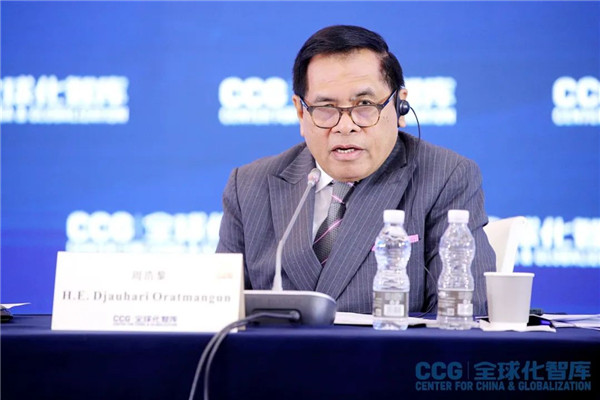
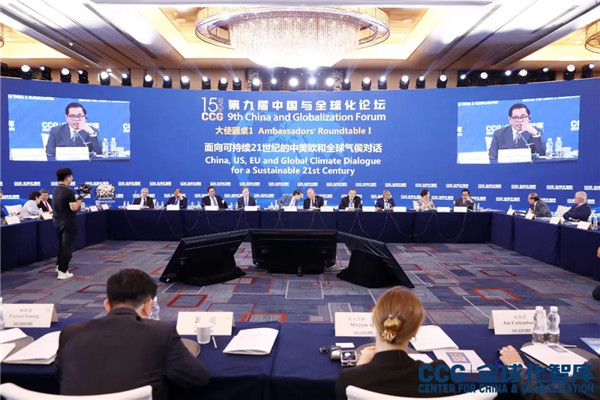
Djauhari Oratmangun, Indonesian Ambassador to China, emphasized the urgency of immediate cooperation and action to tackle climate change. He pointed out that for Indonesia, climate change poses a threat not only to ecosystems but also to economic development. Consequently, Indonesia has taken measures to reduce emissions and promote green transformation. Ambassador Oratmangun stressed the significance of the efforts undertaken by the G3, comprising China, the United States, and Europe, as well as the importance of COP27. He cited Indonesian President Joko Widodo’s statement emphasizing the shared responsibility of everyone and every country in addressing climate change, advocating for win-win solutions over zero-sum games.
Siddharth Chatterjee, the United Nations Resident Coordinator in China, noted that as the impacts of climate change become increasingly pronounced in today’s world, nations worldwide are increasingly prioritizing climate issues such as carbon reduction and sustainable energy. Chatterjee stressed the pivotal role of discussions and cooperation between China, the United States, and Europe in achieving the overarching goals of climate governance. He highlighted the United Nations’ longstanding role as a platform for fostering consensus, promoting dialogue, and encouraging cooperation. Chatterjee affirmed the United Nations’ commitment to ongoing collaboration with China, with a focus on strengthening the development of renewable energy, advancing the transition to a low-carbon economy, and facilitating the integration of complementary strengths, resources, and technological assistance among countries. He underscored the United Nations’ dedication to contributing to the ultimate realization of the 2030 Sustainable Development Goals.
Ambassadors’ Roundtable II, “China-Europe Cooperation in Uncertain Times: Risks and Prospects,” chaired by Huiyao Wang, President of CCG, addressed the foundation and areas of China-EU cooperation under the current global situation. Recent challenges have emerged in China-EU relations. However, both sides are also seeking further cooperation opportunities, and the prospects for bilateral relations remain broad. In this context, the roundtable gathered together:
Wu Hongbo, Special Representative of the Chinese Government for European Affairs
H.E. Rafael Dezcallar, Spanish Ambassador to China (Spain holds presidency of the EU Council for the second half of 2023)
H.E. Jorge Toledo Albiñana, EU Ambassador to China
H.E. Patricia Flor, German Ambassador to China
H.E. Hannes Hanso, Estonian Ambassador to China
H.E. Thorir Ibsen, Icelandic Ambassador to China
H.E. Dario Mihelin, Croatian Ambassador to China
H.E. Leena-Kaisa Mikkola, Finnish Ambassador to China
H.E. Thomas Østrup Møller, Danish Ambassador to China
H.E. Alenka Suhadolnik, Slovenian Ambassador to China
H.E. Andreas Riecken, Austrian Ambassador to China
Sun Yongfu, CCG Senior Fellow; former Director-General of the Department of European Affairs at the Ministry of Commerce.
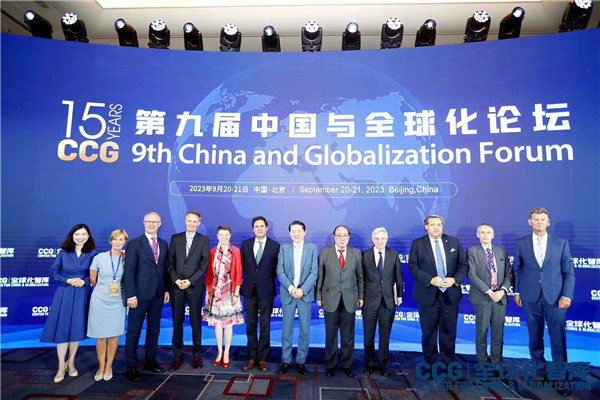

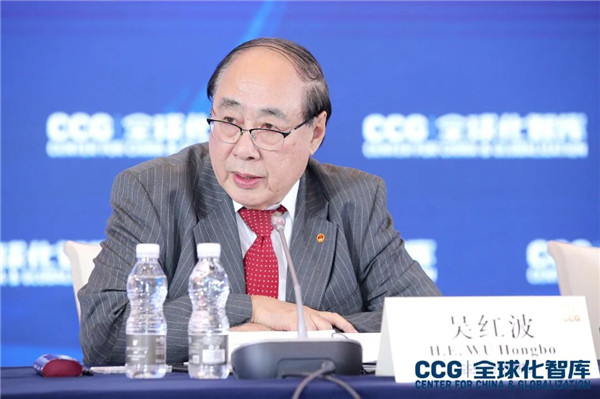
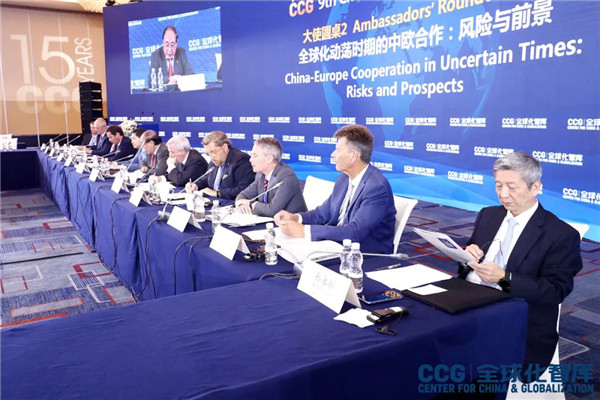
During this session, multiple ambassadors spoke candidly on various topics, covering trade, market access, human rights, and the Russia-Ukraine conflict. Wu Hongbo, Special Representative of the Chinese Government for European Affairs, responded to some of the ambassadors’ viewpoints, offering insights from the perspective of rule-making and international narrative, while explaining China’s stance.
Wu Hongbo emphasized the growing trend of politicization in international issues, as well as the exacerbation of factors like “de-risking” and “decoupling.” These developments have further intensified “pan-securitization,” affecting normal business interactions and economic and trade relations among countries. He stressed the pressing need for countries to collaborate in breaking free from political constraints, striving to establish a fair international trade environment. Regarding human rights issues and the Russia-Ukraine conflict, Wu Hongbo underlined the importance of adhering to the principle of “seeking common ground while reserving differences.” He emphasized the necessity of respecting the security concerns of sovereign states, promoting an international order based on international law, fostering the democratization of international relations, and jointly working towards the construction of a multipolar world.
In the current global economic landscape, which faces challenges such as slowing growth and debt risks, China’s high-quality economic development was recognized as a crucial driving force for stabilizing global economic growth. Against this backdrop, The Trade and Economics roundtable, “China and the Sustainable Global Economy: Where to Now?,” featured a panel of experts and officials, including:
Steven Barnett, Senior Resident Representative of the International Monetary Fund (IMF) in China
H.E. Juerg Burri, Swiss Ambassador to China
Cao Yuanzheng, Chief Economist at the Bank of China International
Karim Dahou, Deputy Director of Global Relations at the Organization for Economic Co-operation and Development
H.E. Graham Fletcher, Australian Ambassador to China
H.E. André Haspels, Dutch Ambassador to China
Ma Xiaoping, Senior Vice President, HSBC Bank (China) and Member of the China & Hong Kong Policy Consultation Committee
Elitza Mileva, Chief Economist for China, Mongolia, and Korea at the World Bank
Beate Trankmann, Resident Representative of the United Nations Development Programme (UNDP) in China
Zhang Wencai, Vice President of the Export-Import Bank of China.
The discussion delved into various topics, including global development cooperation and the sustainable development agenda. Victor Gao, Vice President of CCG, chaired this roundtable.
The Business Roundtable, “Reset, Renew, and Reinvent the Private Sector for Economic Rebound,” addressed the major challenges confronting international economic and trade activities against the convoluted and ever-evolving global landscape. Central to the discussions was the critical importance of bolstering the confidence of both Chinese and foreign enterprises to ensure the overall vitality of the economy. The roundtable was chaired by Mabel Lu Miao, Secretary-General of CCG, and featured distinguished participants, including:
Gianni Di Giovanni, Chair of the Board of Directors, Eni China
Jinag Xipei, CCG Vice Chair; Founder and Chair of the Far East Holding Group
Roberta Lipson, Vice Chairman of the American Chamber of Commerce in China (AmCham China); Founder of United Family Hospitals
Lawrence Jin,CCG Senior Council Member; Deloitte Global Chinese Services Group Leader
Howard Li, CCG Vice Chair; Founder, Chair, and CEO of Waitex Group
Li Ye, CCG Senior Council Member; Vice President and Head of Corporate Affairs and Government Relations, Merck China
Peng Ningke, Board Member and Senior Vice President, SNAM China
Wang Cong,Vice President of Public Affairs and Communications at Novozymes APAC
Zheng Yali, Director of the Strategy Planning Department at China Society of Automotive Engineers
The year 2023 marks the tenth anniversary of the BRI. Over the past decade, the BRI has played a pivotal role in advancing policy discussions among nations, facilitating global connectivity, reshaping the international trade landscape, and propelling worldwide economic growth. In this context, CCG unveiled a comprehensive report titled “The Tenth Anniversary of the Belt and Road Initiative: Review, Outlook, and Suggestions for Multilateral Development” during this forum. Drawing on CCG’s extensive research on globalization, this report places “multilateralism” at its core and proposes several key recommendations for the BRI, including deepening multilateral cooperation based upon existing bilateral and multilateral collaboration frameworks, promoting closer and more efficient integration of the BRI with numerous established international cooperation mechanisms, enhancing the BRI’s role as a provider of international public goods, creating an efficient multilateral cooperation mechanism specifically designed for the BRI, and enabling the BRI to align more effectively with the prevailing trends in global development. Dr. Zheng Jinlian, Vice President and Director of Research at CCG, officially presented this report.
The concluding “Belt and Road” roundtable, “Multi-stakeholder Engagement for Global Development: What Will the Next Decade Bring?,” featured a distinguished panel of experts and leaders. Among them were:
Gao Yuanyuan, President of the China Association for International Economic Cooperation
Harvey Dzodin, Senior Research Fellow at CCG
Hadi Tjahjono, Director of Education, Culture, and Tourism at the China-ASEAN Center
Lin Hongyu, Vice President of Huaqiao University
Pan Xiaoduo, Chief Engineer of the Greater Bay Area Science Forum
Pang Xinxing, Chair of StarTimes Group
Tang Haoxuan, CCG Senio Council Member; Chairman of FUETA International
Xie Haoming, Vice Chair of HNA Aviation Group
Zhang Jiu’an, Director of Research Management and International Cooperation at the Contemporary China and World Institute.
They engaged in a comprehensive and insightful discussion centered on the Belt and Road Initiative’s progress and its role in the ongoing process of globalization. This roundtable was chaired by Mike Liu, Vice President and Senior Fellow of CCG and former President of DXC Technology Greater China.
The day preceding the forum witnessed the grand opening ceremony of the 9th China and Globalization Forum and the 15th-anniversary celebration of CCG. The event drew nearly 250 distinguished guests, including ambassadors representing multiple countries, senior officials from foreign embassies stationed in China, representatives from various central government departments, international organizations, multinational corporations, associations, domestic and international media outlets, as well as esteemed members of CCG’s Advisory Committee. The occasion aimed to facilitate closer interpersonal connections through face-to-face interactions, commemorate a historic milestone in CCG’s journey, and advocate for globalization characterized by increased openness, inclusivity, fairness, diversity, and sustainability.
In attendance at this forum and the gala were:
20 ambassadors and chargés d’affaires from countries such as the United States, Spain, the European Union, Australia, Azerbaijan, Estonia, Iceland, France, Finland, South Korea, Croatia, Latvia, Rwanda, Mozambique, Norway, Sweden, Slovenia, Ukraine, Hungary, New Zealand, Indonesia, and others.
Senior officials from embassies in China representing Germany, Croatia, the United States, Norway, Switzerland, Slovenia, the United Kingdom, and more.
Representatives from over a dozen central government departments and government agencies, including the Ministry of Foreign Affairs, the Ministry of Commerce, the Ministry of Science and Technology, the Ministry of Ecology and Environment, the State Council Information Office, the Ministry of Human Resources and Social Security, the United Front Work Department, the Publicity Department, the Beijing Municipal Party Committee and Municipal Government, the National Committee of the Chinese People’s Political Consultative Conference, and the Beijing Municipal Committee of the Chinese People’s Political Consultative Conference.
Leaders of international organizations such as the United Nations Resident Coordinator’s Office, UNICEF, UNFPA, UNAIDS, the World Health Organization, the International Committee of the Red Cross, the Organisation for Economic Co-operation and Development, the International Organization for Migration, and the International Monetary Fund.
Business leaders and senior executives from companies including Danaher, ETS, Hillhouse Capital Group, Qualcomm, Huawei, FedEx, KKR, Morgan Philips, Micron Technology, Bombardier, Vanke Group, and Wiwynn Corporation.
Representatives from organizations and universities such as the China Public Diplomacy Association, the China People’s Association for Friendship with Foreign Countries, the China International Economic Cooperation Society, the Chinese Academy of Social Sciences, the Paulson Institute, the Xu Beihong Art Committee, the Adenauer Foundation, CITIC Press Group, Foreign Languages Press, the China Science and Technology Press, Renmin University of China, Beijing Normal University, the University of International Business and Economics, Beijing Foreign Studies University, and Huaqiao University.
Leaders of business chambers and associations including the China-EU Chamber of Commerce, the China-France Chamber of Commerce and Industry, the China-Britain Business Council, the China Healthcare Investment & International Trade Promotion Association, the American Chamber of Commerce in China, the Malaysia-China Chamber of Commerce, and the Japan External Trade Organization.
Representatives from prominent media outlets such as People’s Daily, China Daily, Economic Daily, Beijing Review, The Wall Street Journal, Financial Times, The New York Times, Agence France-Presse, The Straits Times, and more.
Videos | CCG 9th China and Globalization Forum
